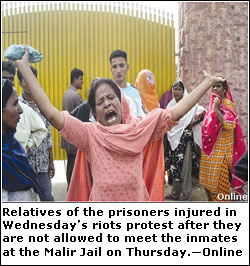Press Release, October 17, 2008
Lahore: The Human Rights Commission of Pakistan (HRCP) has expressed serious concern at recent incidents of prison unrest in the country and asked the government to undertake urgent prison reform instead of depending on short-term measures.
In a statement issued on Friday, HRCP said: “The recent rioting in prisons of Hyderabad, Karachi, Multan and Timergara and the loss of life there is tragic but unfortunately not unexpected. These incidents are a result of problems left unresolved for decades.
The issue is certainly bigger than prison riots or attempted jailbreaks alone. Appalling overcrowding, rampant corruption, torture, unhygienic food, lack of health facilities and staff training, tardy judicial process, inefficient investigation and prosecution are all key issues that have not been addressed and cannot be wished away.
Numerous committees set up in the past 20 years for prison reform have danced around these issues without meaningfully tackling them. Many useful proposals advanced by them have been ignored.
Measures such as suspending jail officials, registering cases against prisoners accused of rioting, and shifting detainees to other jails to avoid recurrence skirt the real issue. Reported torture and beating of prisoners following the riots is no solution, nor is providing police more teargas shells and smoke bombs, as is being considered following the riot in the Hyderabad jail.
According to the jail surgeon, the prisoners shot dead during rioting at Karachi’s Malir District Jail by guards had all been shot in the head or chest. This is hardly the ideal method for riot control or a use of minimum force needed to quell the rioting and points to deficient training for jail staff at the very least.
The top leadership of the country is aware of the problems facing the prison system as they too have served extended jail terms. They have also suggested immediate remedial measures, which must be implemented.
Prisoners’ rights, including their right to life and dignity, must be observed in all circumstances and their safety ensured. Punishments other than penal servitude should also be considered, especially for petty crimes, to reduce population of jails already holding prisoners many times over their capacity. Prisoners must also be allowed communication with their family and lawyers via phone, at least under supervision. The criminal justice system needs to be reviewed and an adequate number of judicial officers ensured to tackle undue delay in deciding cases. The approach toward the prison system needs to be changed — the prisoner and the jailer both need to be humanised and terms of service of jail staff improved. A change in the Code of Criminal Procedure in October 2001 took away a provision regarding mandatory bail to prisoners whose trial had not begun for two years. This was presumably done to deny the provision’s benefit to political prisoners, but has led to massive swelling in the prison population.
The government must earnestly pursue a crash programme to deal with the issues and ensure that reforming prisoners must be central to any prison reform initiative.”
Asma Jahangir
Chairperson
